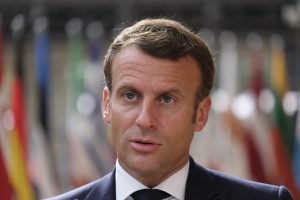From July 24-29, French President Emmanuel Macron will embark on a historic journey to the heart of the South Pacific. After his visit to New Caledonia, he will be the first French president to travel to non-French Pacific islands: Vanuatu and Papua New Guinea.
This highlights a paradox for France in the region: Despite possessing territories, the largest exclusive economic zone in the area, and the presence of two sovereign forces with over 2,700 military personnel, its diplomatic influence in the Pacific remains relatively modest.
The purpose of the presidential visit is to reestablish a shaken legitimacy, which has faced challenges on both a national level due to the emergence of independence movements and on a geopolitical level due to the proliferation of cooperation schemes led by the United States without France’s participation.
Restoring the Bond Between Paris and the French Pacific Territories
In New Caledonia, Macron seeks to restore trust following the December 2021 referendum, whose legitimacy is contested by the independence movement. Pro-independence groups refuse to participate in negotiations to exit the Matignon process and determine the island’s future status. This institutional deadlock fuels political tensions and raises suspicions about the French authorities’ commitment to the decolonization process.
These criticisms, along with grievances related to the French nuclear testing in French Polynesia between 1966 and 1996, contribute to weakening France’s position in the region. Furthermore, the ascent of French Polynesia’s pro-independence party to power at the local level in May 2023 reignited the debate on greater autonomy for Papeete.
Restoring trust requires a realignment of priorities between Paris and its territories. Previous visits by Macron highlighted a significant gap between the concerns of local authorities and populations, encompassing economic, social, and environmental issues, and the president’s focus on grand strategy in the Indo-Pacific and on the vulnerability of these territories to predatory powers, including China. Therefore, the French authorities must make efforts to implement their Indo-Pacific approach at the subregional level, in close consultation with the elected local communities.
A recent report from the Territorial Assembly of French Polynesia, in cooperation with New Caledonia and Wallis and Futuna, clearly demonstrated that the Indo-Pacific approach, defined solely by Paris, has caused confusion and frustration, while the territories are eager to embrace and adapt this concept to defend their own interests. This is particularly important as local governments have significant competencies in sustainable development, as well as regional and international cooperation. Over the past decade, Paris has encouraged the development of a neighborhood policy for its overseas territories, viewing it as a way to relay French interests within regional organizations like the Pacific Islands Forum. Therefore, involving the overseas territories is essential to legitimize and root the Indo-Pacific strategy locally.
On a Geopolitical Level, a Return to a More Pragmatic Approach
The announcement of AUKUS, the defense partnership between Australia, the United Kingdom, and the United States in September 2021, dealt a blow to French ambitions in the region, as it effectively killed a deal for France to supply submarines to Australia. AUKUS also exposed the limitations and contradictions of France’s balancing act, seeking to provide an alternative to the choices imposed by the China-U.S. rivalry. Paris indeed lacks both the military capabilities and diplomatic weight required to play such a role.
This posture of “balancing power” in reality confines France within the grip of China-U.S. rivalry and complicates its efforts to exert influence, promote its interests, and establish regional partnerships. For example, France has chosen not to formally join the U.S. initiative “Partners in the Blue Pacific,” arguing that it would send a negative strategic signal to China. With countries like Germany and South Korea expected to join the group, France runs the risk of appearing isolated rather than independent, lacking a credible alternative to offer.
In the midst of a new geopolitical game in the Pacific, France, despite having sovereign interests in the region, does not yet have a regional strategy like the United States, Australia, or the United Kingdom. Macron should clarify France’s political priorities in this Indo-Pacific subregion and signal France’s increasing engagement on issues such as climate change, environmental security, and maritime safety, all of which are central to the concerns of the Pacific Island countries.
France already has the proper tools at its disposal. The French Development Agency (AFD) is at the forefront in the region in preserving biodiversity and countering climate change. Its flagship project, the Kiwa Initiative, brings together multiple donors to strengthen ecosystem and economic resilience in the face of the climate challenge, both in French Pacific territories and in other regional countries. Partners such as India, Japan, and South Korea could potentially join this initiative, while new investments are planned for other projects in the coming years.
Likewise, the experience and expertise of the French armed forces in the region need to be better recognized and valued. Since 1992, France has coordinated militarily with its Australian and New Zealand partners within the FRANZ agreement to provide humanitarian assistance and support in response to natural disasters in the region, such as the recent case in Tonga. Together with the United States, this group forms the “Quad Pacific,” assisting Pacific Island states in monitoring their large exclusive economic zones and combating overfishing. Since 2021, France has established a regional coast guard seminar to develop a framework for enhanced capacity and coordination. These mechanisms could also be potentially expanded to legitimate and interested partners, such as Japan, or even the United Kingdom.
Lastly, the French Pacific territories have the potential to become strongholds for Europe in the region, serving as centers of excellence and innovation that offer practical solutions for the sustainable development of island states.
These directions have the merit of reconciling sovereign interests and power interests, positioning France as a constructive stakeholder in the Indo-Pacific. Concrete actions that address the needs of sustainable development, human security, and maritime safety in Pacific Island nations will have a significant geopolitical impact, far greater than a strategy that may sometimes be misunderstood.

































